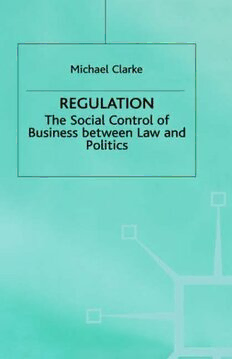
Regulation: the Social Control of Business Between Law and Politics PDF
256 Pages·1999·0.839 MB·English
Most books are stored in the elastic cloud where traffic is expensive. For this reason, we have a limit on daily download.
Preview Regulation: the Social Control of Business Between Law and Politics
Description:
Regulation results from industrialization, which greatly increased the hazards to which populations are subject and, with mass democracy, enhanced the capacity of populations to demand protection. With the rise of the consumer society and economy, workers and consumers now press for public regulation of matters that in the past have been regulated largely privately by business itself, through trade and industry associations, cartels and by the professions. The state is now pressed to intervene and often to act as guarantor, and in doing so has been attacked by the 'new right' as unduly restrictive and as imposing unnecessary burdens on business. The book maps the reality of regulation, seen as a constantly developing range of institutions, public and private, and identifies what is required for regulation to be effective. It pulls together studies on the functioning of regulation in many areas of business, drawing on international scholarship in sociology, political science, law and economics.
See more
The list of books you might like
Most books are stored in the elastic cloud where traffic is expensive. For this reason, we have a limit on daily download.
